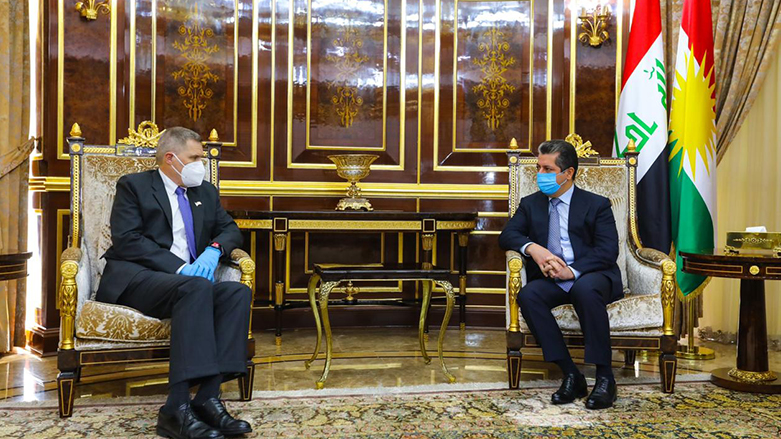PM Masrour Barzani meets US ambassador: expresses ‘concerns’ over treatment of Kurds in disputed territories; ‘positive atmosphere’ in Erbil-Baghdad talks

ERBIL (Kurdistan 24) - The Prime Minister of the Kurdistan Region, Masrour Barzani, expressed ‘concerns’ over the treatment of the Kurdish population in the disputed territories during a meeting on Monday in Erbil with the top US diplomat in Iraq, Amb. Matthew Tueller.
Barzani also explained to Tueller that there had been a “positive atmosphere” in the recent discussions between Erbil and Baghdad.
In their meeting, which was also attended by the US Consul General in Erbil, Rob Waller, the Kurdish Prime Minister and the US Ambassador also discussed strengthening bilateral relations between the Kurdistan Region and Washington, according to a press release from Barzani’s office.
The meeting followed on the second round of the “Strategic Dialogue” between the US and Iraq, held last month in Washington. In those discussions, US officials pressed their Iraqi counterparts to settle their differences with Erbil in accord with Iraq’s 2005 constitution—as Kurdish officials have long called for.
Read More: The US-Iraq Strategic Dialogue: Good news for the Kurdistan Region
Some three weeks after the Strategic Dialogue discussions in Washington and after meeting with senior Jordanian, Egyptian, and Saudi officials, Iraq’s new leader, Mustafa al-Kadhimi, paid his first visit to Erbil as prime minister.
Read More: PM Masrour Barzani calls for ‘fundamental’ solution for Erbil-Baghdad disputes
In Monday’s meeting with Tueller, Barzani said that there was now a “positive atmosphere” between the regional and federal governments and, along with that, a “good opportunity” to resolve outstanding issues between the two on the basis of the Iraqi constitution and take into account “the Kurdistan Region’s constitutional rights and financial entitlements” and “the interests of all the Iraqi people.”
For his part, Tueller expressed Washington’s willingness to further enhance economic ties with the Kurdistan Region and boost American investments in the region. They also discussed ways to enhance coordination and the framework for cooperation with the US in order to advance the talks between Erbil and Baghdad, while overcoming the current financial crisis and health challenge caused by the coronavirus.
Mistreatment of Kurds in Disputed Areas
Barzani also expressed his “concerns” over the treatment of Kurdish people in the disputed territories, particularly by local authorities in those areas, which are claimed by both the Kurdistan Regional Government and the federal government.
Recently, Kurdish farmers and other residents of the disputed Kirkuk province have said that local authorities are conducting a new “Arabization” program, by allowing an influx of people who are not native to the province.
“Since the 1930s, but particularly from the 1970s onwards [i.e. under Saddam Hussein], successive Iraqi administrations have forcibly displaced hundreds of thousands of ethnic Kurds, Turkomans, and Assyrians from northern Iraq, and repopulated the area with Arabs moved from central and southern Iraq,” Human Rights Watch noted in a 2004 report, published shortly after the start of the US-led war that ousted Saddam and his regime.
Barzani also stressed to the US ambassador the importance of security cooperation between the Peshmerga and the Iraqi Security Forces in the disputed territories, as the threat of terrorism from the so-called Islamic State is increasing in those areas.
Editing by Laurie Mylroie
